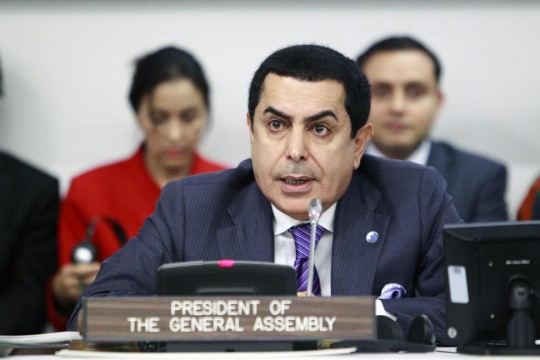South-South cooperation crucial to guarantee food security – top UN official
South-South cooperation crucial to guarantee food security – top UN official

General Assembly President Nassir Abdulaziz Al-Nasser
South-South cooperation is a key element to tackle hunger and ensure food security, a top United Nations official said today, calling on countries to strengthen their partnerships at the Global South-South Development (GSSD) Expo in Rome.
“Around the world, almost 925 million people go to bed hungry each night. Most of them are in the South,” said President of the General Assembly Nassir Abdulaziz Al-Nasser, urging countries at the expo to expand the search for innovative and sustainable solutions to food security.
For five days, participants at the GSSD expo, which began today, will meet to discuss ways to achieve sustainable and equitable development and transfer effective solutions with the support of the donor community under innovative public-private partnerships.
Mr. Al-Nasser said the event offers States the opportunity to examine successful strategies and technologies and learn from each other when it comes to improving agricultural productivity, increasing social protection, managing fragile ecosystems, improving nutrition, and combating diseases.
Mr. Al-Nasser also stressed the importance of partnerships not just between the South but also with Northern countries. “South-South cooperation complements – and does not replace – North-South cooperation,” he said.
In addition, he highlighted initiatives that are already improving food security conditions for countries in the South such as the Global Dry Land Alliance-Partnering for Food Security, which seeks to strengthen cooperation among dry land nations, and the African Union’s Great Green Wall Initiative, which aims to plant a wall of trees across Africa, from Senegal to Djibouti, to combat the effects of land degradation, aridity and desertification.
Mr. Al-Nasser underscored that partnerships will increase the capacity of all developing countries to “feed their citizens, raise production capacities, and gainfully participate in food supply chains created to meet rising food demands in rapidly growing populations.”
###
> United Nations (UN).
 The United Nations was established on 24 October 1945 by 51 countries committed to preserving peace through international cooperation and collective security. Today, nearly every nation in the world belongs to the UN: membership totals 192 countries.
The United Nations was established on 24 October 1945 by 51 countries committed to preserving peace through international cooperation and collective security. Today, nearly every nation in the world belongs to the UN: membership totals 192 countries.
When States become Members of the United Nations, they agree to accept the obligations of the UN Charter, an international treaty that sets out basic principles of international relations. According to the Charter, the UN has four purposes:
- to maintain international peace and security;
- to develop friendly relations among nations;
- to cooperate in solving international problems and in promoting respect for human rights;
- and to be a centre for harmonizing the actions of nations.
###
* The above story is adapted from materials provided by United Nations (UN)
** More information at United Nations (UN)




















